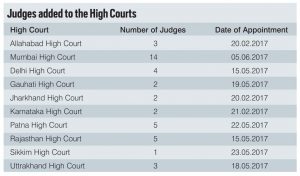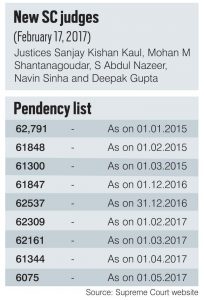During his eight-month tenure, the chief justice adopted novel and clever ways to bring down the pendency of cases and constituted vacation benches to hear cases
~By Mary Mitzy
Chief Justice of India JS Khehar demits office on August 27 after a short, eight-month tenure. However, when he does, he would have left to his successor and the judicial system a legacy of efficiency and diligence, built through his tireless efforts in reducing pendency.
Justice Khehar’s stint at the top would last 120 working days, out of which 82 were before the summer vacations and 38 after that. He realised that the summer vacations were to be utilised and tried to introduce more than one vacation bench and took up critical cases during this time.
What he has so far achieved is worthy of applause. When he assumed the top office at the Supreme Court, the number of cases pending there were 62,791; by May 1, this had come down to 60,751. On the face of it, the disposal of 2,040 cases during this short period is a major achievement. However, one has to keep in mind that many cases were filed during this period and that Justice Khehar had to manage all this within the constraints of a severely understaffed court.

So how did he do it? The Khehar period, as one may call it, would be marked by a shift in approach: a transition from a soft-spoken and patient former CJI TS Thakur to the tough, no-nonsense CJI. Since taking charge, he has been tough and impatient while hearing lengthy and unnecessary arguments. He had himself admitted at the retirement felicitation of Chief Justice Thakur that he was jealous of his patience. However, one issue that he inherited from his predecessor is the strained relationship between the judiciary and the government. This is a Gordian Knot that has yet to be resolved.
 This strained relationship continues, as all recommendations made by the Supreme Court collegium stand to be scrutinised with a fine toothcomb. The approved numbers always fall sharply. With increasing pendency on one side and a depleted bench on the other, not to talk of the long vacation in between, it was a Herculean task for Justice Khehar.
This strained relationship continues, as all recommendations made by the Supreme Court collegium stand to be scrutinised with a fine toothcomb. The approved numbers always fall sharply. With increasing pendency on one side and a depleted bench on the other, not to talk of the long vacation in between, it was a Herculean task for Justice Khehar.
He built a bridge with the Executive and succeeded to a large extent in filling up many vacancies. He got in five judges to the Supreme Court and has, so far, appointed 41 judges to different high courts. Similar efforts made by Justice Thakur and earlier CJIs had resulted in showdowns with the government. He did not get his desired quota of judges, but Justice Khehar was not one to wait for the right moment. He had to get to his next target of reducing pendency.
He took drastic measures to bring down pendency. He streamlined the listing process and gave directions to the registry to list all pending PILs and writ petitions which could be disposed of easily. Suddenly, the causelist would see a large number of old writ petitions getting listed. He had another clever approach: party-in-person cases where the person has more than one case, were all listed together.
He also put fear into people for filing frivolous cases and did not hesitate in imposing a heavy cost for this.
In the matter of Suraz India Trust, which had filed a large number of PILs, which were all dismissed, the bench headed by Justice Khehar imposed a cost of Rs 25 lakh, stating that “misconceived intervention by incompetent persons prevent the courts from dealing with serious issues”.
On many occasions, Justice Khehar has told the lawyer that if he/she filed any more such frivolous cases, he would impose a cost. In a case by the Haryana State Cooperative Labour and Construction Federation Ltd., the bench headed by him imposed a cost of Rs 5 lakh for going to five forums without any jurisdiction. While imposing the cost, he said: “You are destroying the judicial system.”
 The result of all this has been that in regular PILs, petitioners and lawyers went on the backfoot, desisting from filing fresh petitions. The fear of costs being imposed opened up time for more serious cases. The CJI also directed the registry to tag together cases where issues to be decided were the same so that they could be disposed of in one go and faster. Many tax and service matters were tagged and heard together, thereby saving judicial time and avoiding possible conflicting judgments.
The result of all this has been that in regular PILs, petitioners and lawyers went on the backfoot, desisting from filing fresh petitions. The fear of costs being imposed opened up time for more serious cases. The CJI also directed the registry to tag together cases where issues to be decided were the same so that they could be disposed of in one go and faster. Many tax and service matters were tagged and heard together, thereby saving judicial time and avoiding possible conflicting judgments.
Another interesting method he adopted was listing all transfer petitions on non-miscellaneous days. Transfer petitions do not take much time to dispose of. Courts granted short time-frames to complete the pleadings in transfer petitions, listed them immediately and decided the matter. When the parties were agreeable, he would advise them to go to the mediation centre and settle the dispute rather than continue litigating.

Two months before the vacation, he was preparing for matters to be disposed of by vacation benches. If anyone requested an early listing, he would ask the counsels to argue the matter before the vacation bench. Some agreed, some didn’t.
Justice Khehar created history by constituting Constitution Benches during the summer vacations. It was not easy to convince lawyers to appear and argue during vacations. Some objected to it, but he put his foot down and insisted that they had to come. He must have faced an equally difficult task in convincing the judges to sit during the vacation.
The bench headed by Chief Justice Khehar heard the triple talaq case during the summer recess though the judgment has been reserved. Another bench headed by Justice Dipak Misra heard the question of breach of privacy in the WhatsApp matter, though the bench could only conclude the arguments on maintainability and the order is pending. The Social Justice bench which was to hear the question of illegal migrants of Assam could not meet during the vacation as lawyers submitted that they would not be able to conclude the hearing in a week.
Lawyers may complain that Justice Khehar is tough, but the truth is that under his management, pendency of cases came down. However, his disposal on merit and his stand on sensitive cases are yet to be seen, felt and understood by the legal fraternity as well as the common man.


